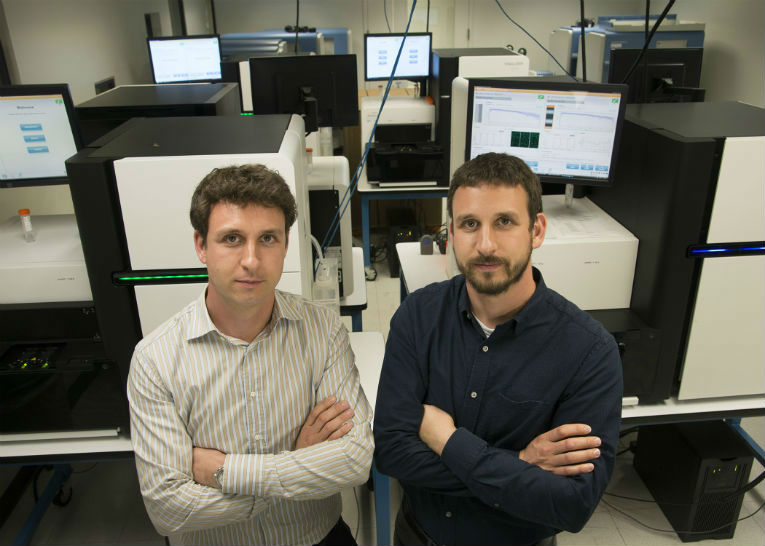 Alumni profiles – Obi (left) and Malachi Griffith – by Diane Poulin
Alumni profiles – Obi (left) and Malachi Griffith – by Diane Poulin
It is possible that twin brothers who got their start in science at The University of Winnipeg could change how we understand and treat cancer. Dr. Malachi Griffith and Dr. Obi Griffith are on the front line of cutting-edge cancer research, and at the age of 36, are on WIRED Magazine’s 2013 Smart List.
They are both assistant directors at The Genome Institute, Washington University School of Medicine, which employs more than 200 faculty and staff from a variety of disciplines. This is the world of bioinformatics, which combines computer science, statistics, math and engineering to study and process biological data. The goal is to catalog the genetic changes found in cancer.
THE INNOVATORS
The brothers were nominated for WIRED Magazine’s second annual Smart List by The Genome Institute’s Co-Director, Dr. Elaine Mardis. WIRED magazine invites 50 top achievers to nominate fresh, exciting thinkers whose ideas have the potential to change the world. Dr. Mardis put forth Obi and Malachi Griffith. “They’re set to change the world of cancer genomics,” said Dr. Mardis in her nomination.
“Both of us started out working in wet labs, with cells and test tubes but over the last ten years we have moved completely into dry labs, which basically means sitting in front of a computer and attending a lot of meetings with post-docs and students,” says Malachi. “We are doing cancer genome analysis and developing databases.”
“Every science is becoming data science” adds Obi. The brothers are interviewed together from a shared office at Washington University.
What is so new and potentially game-changing about their work is the idea of personalized cancer genome therapy. It works like this: a patient gets a biopsy. The genome sequence of that tumour is then determined, leading to clues for a specific treatment or drug therapy. “The concept is there for a handful of genes and tumour types right now, but the hope is to personalize cancer treatments more and more,” says Obi. “Clinical trials are underway to see if outcomes really can be improved for people using these approaches.”
UWINNIPEG’S INFLUENCE
Both Malachi and Obi started out at UWinnipeg studying botany, coming from a family interested in agriculture and plants. “But fairly early on we both decided we wanted to be in medical research and switched to biology and biochemistry majors, with courses in genetics. We had some very inspiring professors at UWinnipeg,” says Malachi, singling out Robin Woods’ genetics classes, and Scott Forbes for his evolutionary biology class and what they describe as a very forward-thinking bio-modeling course. “That bio-modeling course was a precursor to bioinformatics.” Obi recalls that “it was professors Désirée Vanderwel and Alberto Civetta that first introduced me to biostatistics and gave me that first taste of number crunching”.
Before his Washington University post, Malachi was a bioinformatics post-doctoral fellow at the BC Cancer Agency Genome Sciences center in Vancouver, British Columbia. He received his PhD (Medical Genetics, 2009) from the University of British Columbia.
Obi completed bioinformatics post-doctoral fellowships at Lawrence Berkeley National Laboratory in Berkeley, California and at the BC Cancer Agency Genome Sciences Centre in Vancouver, British Columbia. He received his PhD (Medical Genetics, 2008) from the University of British Columbia. In addition to WIRED magazine, he was profiled in Maclean’s magazine as one of Canada’s 25 ‘Best and Brightest’ for his contribution to the sequencing of the SARS genome. Both have been profiled as ‘up and coming investigators’ by Genome Technology Magazine.
Malachi and Obi share their insights with today’s UWinnipeg students immersed in biology. “Many select biology because they like understanding the living world. But more and more that needs to be combined with math, statistics and data, to really think analytically,” says Malachi. Obi also cautions that the world of scientific research is highly competitive and academic appointments are limited. “The good news is that there are many exciting opportunities in industry today. I would tell students to consider options in the biotech and IT industries, where some of the most exciting research now happens.”
The Genome Institute has a unique mandate: to help improve the human condition, encourage collaboration, and engage the next generation of scientists. Malachi and Obi Griffith are an important part of that mission.
Malachi (BSc Honours, 2002, Biology/Biochemistry)
Assistant Professor, Genetics; Assistant Director, The Genome Institute, Washington University School of Medicine
Obi (BSc Honours, 2002, Biology/Biochemistry)
Assistant Professor, Medicine; Assistant Director, The Genome Institute, Washington University School of Medicine
Reads more articles in the 2015 Spring UWinnipeg Magazine here.




